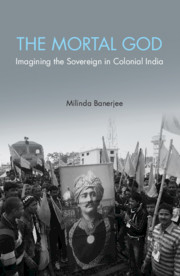Book contents
- Frontmatter
- Dedication
- Contents
- Acknowledgements
- Note on Transliteration
- Abbreviations
- Note on Documents Used
- Introduction
- 1 ‘Caesar of India’: Debating the British Monarchy and Colonial Rulership
- 2 ‘State is the Household Vastly Enlarged’: Imagining Sovereignty through the Princely States
- 3 ‘One Law, One Nation, One Throne’: Debating National Unity
- 4 ‘One has to Rule Oneself’: Collectivising Sovereignty in Peasant Politics
- 5 ‘God's Kingdom Has Come’: Messianic Sovereignty in Late Colonial India
- Conclusions and Further Thoughts
- Index
5 - ‘God's Kingdom Has Come’: Messianic Sovereignty in Late Colonial India
Published online by Cambridge University Press: 13 September 2018
- Frontmatter
- Dedication
- Contents
- Acknowledgements
- Note on Transliteration
- Abbreviations
- Note on Documents Used
- Introduction
- 1 ‘Caesar of India’: Debating the British Monarchy and Colonial Rulership
- 2 ‘State is the Household Vastly Enlarged’: Imagining Sovereignty through the Princely States
- 3 ‘One Law, One Nation, One Throne’: Debating National Unity
- 4 ‘One has to Rule Oneself’: Collectivising Sovereignty in Peasant Politics
- 5 ‘God's Kingdom Has Come’: Messianic Sovereignty in Late Colonial India
- Conclusions and Further Thoughts
- Index
Summary
Introduction
In this chapter, I argue that messianic politics helped forge ideological links between elite nationalism and popular (especially peasant) politics in late-colonial India (ca. 1919–47). These emerged through the intersections between popular visions of messianic and millenarian liberation, Hindu-Indian and Indo-Islamic nationalist (and transnational) political theologies and various forms of socialist-Communist discourses. I use the term ‘messianic’ in a flexible and encompassing way, to refer to Indic ideals of avatara and miraculous ascetic rulership, Islamic notions of Mahdi, mujaddid and Allah's kingdom to come, and Christological ideas. While some of the idioms discussed here were not messianic in a narrow sense, they were proximate to utopian and millenarian themes and therefore merit critical scrutiny. I also foreground the class and community differences which created schisms within these imaginaries and limited their appeal. While peasant visions were often grounded in attempts to remove colonial revenue, rents and taxes, and to create a space for militant peasant power in a utopian polity, elite ideologies sought to harness the peasants into projects of nation-making without necessarily overturning the social order. Messianic movements articulated anti-colonial imaginaries of ‘modernity’, crafted not exclusively through teleological exercises imposed from above, but also through combative resistance against state apparatuses. The ‘modernity’ of these visions lay in their efforts to create utopian political systems characterised by diverse conceptions of freedom, justice and rights, even as these programmes were inspired by more ancient grammars of divinely-ordained rulership and political community. The messianic polity and sovereign were ‘hybrid’ icons: representations of progress sculpted through conversations and compromises between varied communities and classes of Indians and the colonial state.
These visions were rooted in transregional contexts. The global First World War fuelled political anxieties among Indians and helped forge new messianic hopes for a better post-war world. Contestations about the Ottoman Caliphate snowballed into expectations about the advent of a kingdom of God, while the Russian Revolution and the early Soviet state offered new sources of utopian hope. Gandhi, among other Indians, cast the struggle against the British Empire as a replay of Judaeo-Christian resistance to the ancient Roman Empire, even as he himself acquired a messianic image among many Indians. Further, with respect to transregional history, one may link South Asian and European politics in terms of the global effects of the Great Depression in increasing the traction of charismatic sovereign figures.
- Type
- Chapter
- Information
- The Mortal GodImagining the Sovereign in Colonial India, pp. 350 - 397Publisher: Cambridge University PressPrint publication year: 2017



